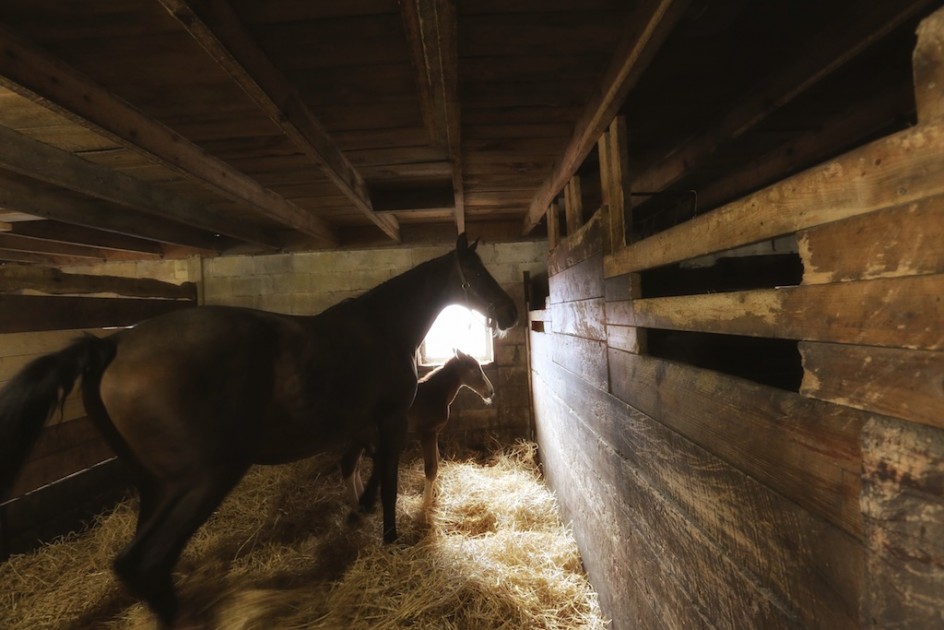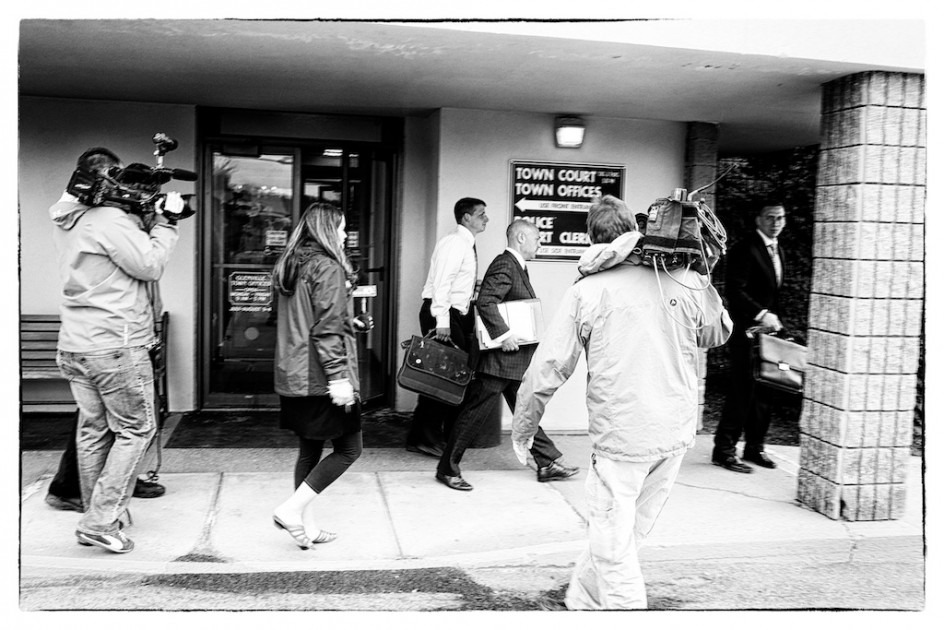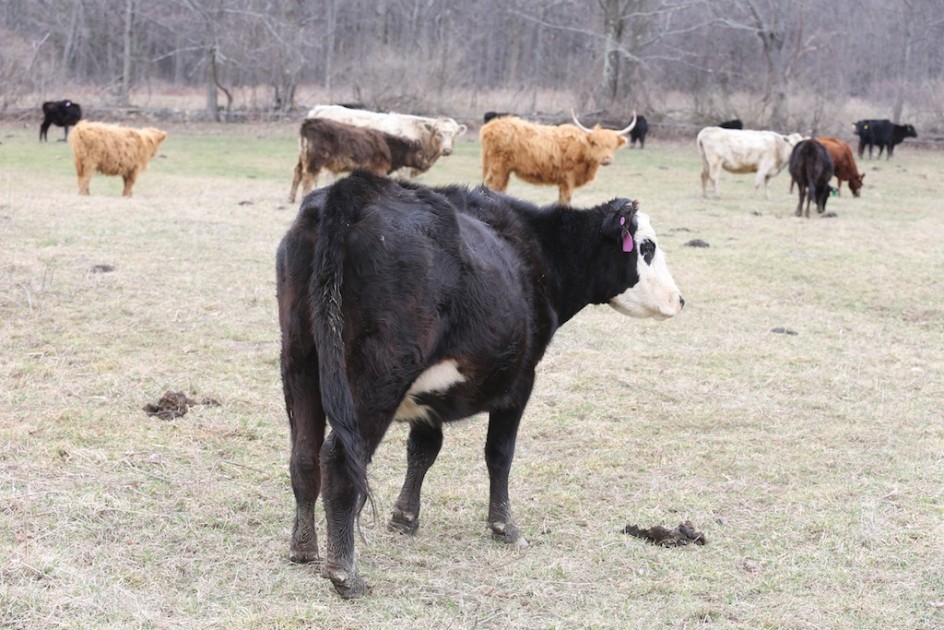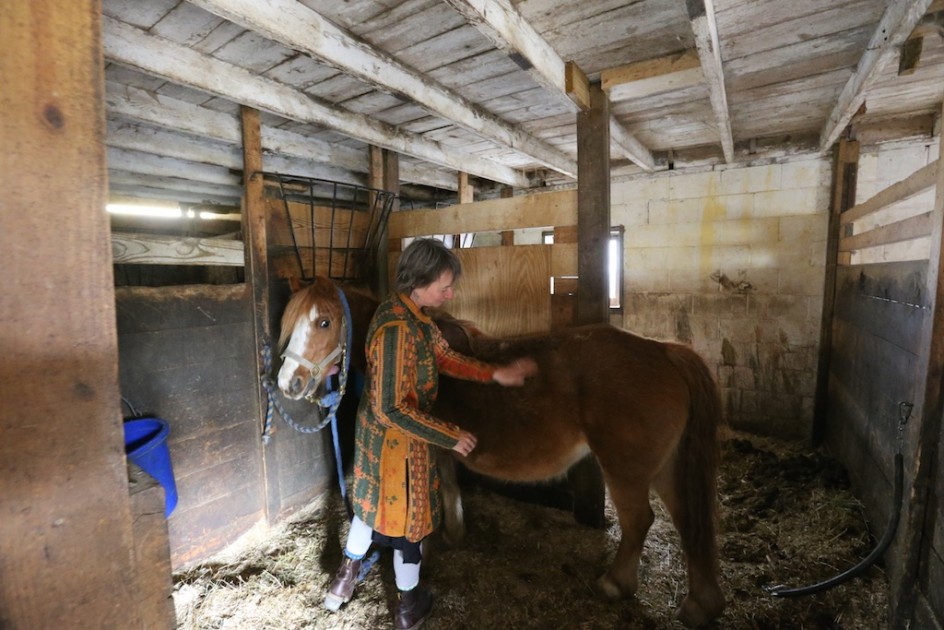
I took this photo Sunday at Ken and Eli Norman’s Thornwood Farm, the foal had just been born. Eli says the foal, a female, will stay with them. They are popular on the Internet.

it is always a shocking thing for me to see an innocent person treated like a criminal in his own community, I think when a culture criminalizes farming in the name of loving animals, it is turning to the dark side. Farmers are part of a nation’s soul, we fare as they fare, we suffer as they suffer, even if we rarely realize it. A country that forgets where it’s food comes from and what the real l lives of animals are like is losing itself in a different way.
Today, another hearing in the saga of Joshua Rockwood, a young farmer caught in a brutal winter, now facing 13 charges of animal cruelty and neglect in a community that seems to know nothing about farms or animals any longer. It’s hard to imagine anyone having a good day in the midst of this long, painful, expensive and arduous ordeal. But Joshua has set about proving that there is justice for an honest man, that the legal system can work for him as well as against him.
He had a good day today.
Unlike so many of the people caught up in the hysteria over animal cruelty and abuse, Rockwood knows how to use his blog and the Internet, he has raised $55,000 online for his legal fees and drawn a powerful army of supporters to his side. They are loyal and loving people, I am very happy to sit among them.
The judge announced the case today as “West Wind Acres Farm versus the complainant, Peaceful Acres Sanctuary,” so it has at least become clear who the complainant was and is. Today’s hearing – delayed from 10:30 a.m. to 1:30 p.m. was not about the charges of animal cruelty, it is about how much Joshua is being asked to pay by the Peaceful Acres rescue farm in order to get his two draft horses and pony back, should that become possible.
To date, the bill for boarding the three horses is $7,500, according to Nanci Beyerl, director of Peaceful Acres. That is for the first 30 days only, it does not include the last month. Beyerl was called to testify about the costs of caring for Joshua’s seized horses, and Joshua’s attorney, Andrew SaFranko was eager to question her about her charges and fees. About 30 of Joshua’s friends, family and supporters came to the hearing, even mid-day, some came long distances to show support for him.
Real courtroom scenes are not like Law & Order or Perry Mason. Smart modern lawyers speak slowly and carefully, take notes, reference files, there are no fireworks, little drama. I’ve covered a lot of trials, SaFranko had done his homework, and knew his stuff. Court proceedings are almost uniformly boring, not exciting. There are lots of conferences, delays, reading of statutes. Still, the cross-examination of Beyerl was, I thought, both revealing and disturbing. It was something of a surprise to me.
And it did shed some light on some of the very troubling issues raised by the Rockwood case. First, Rockwood is accused of nothing that doesn’t happen on almost every real farm in America, especially in a brutal cold wave. Then, there is the increasingly incestuous relationship between some animal rights organizations and the police, who are being drawn into the deepening conflict over the future of animals in our world and the true nature of farming. Americans have, in fact, forgotten where their food comes from and they have forgotten the people who make their food possible.
There are issues relating to conflicts of interest involving people given great authority over other people, and who often have a financial stake in the outcome of their actions and accusations. As the animals of the world disappear in the new Inquisition over animal abuse, the fate of every one becomes more precious. No one is opposed to animal rescue or animal abuse, and so no one thinks to question animal rights organizations and some rescue operations about their procedures. But the Rockwood case is raising a number of questions.
And then, there is the powerless and frightening position many farmers and animal lovers – especially poor ones – find themselves in when confronted with the Orwellian power and aggression of the contemporary animal rights movement and its growing links to local governments. Joshua Rockwood knows how different his story might have been if he had not been able to raise all that money on his gofundme site.
I have three good friends who operate horse and animal rescue farms and sanctuaries – one of them, Ken Norman, our friend and farrier – was sitting right next to me in the courtroom, and in the interests of fairness, I cannot believe how hard they work, how little money they have or earn, or how open they are about what they do. It is all about the horses for them, I don’t think any of them know what a management fee is.
So I was interested in hearing Nanci Beyerl’s testimony.
Beyerl was part of the convoy that came to Joshua Rockwood’s farm in March – she testified that she was asked by the police. The raiding party seized the three horses, and left a large paper trail of charges and accusations, none of which have yet to be addressed in court.
Beyerl conceded that she charges twice as much money for impounded horses – those seized in cruelty cases – as she does for rescue horses who are not impounded. She is asking Joshua to pay for more than $800 a month for the care of his horses if he wishes to get them back, or even if he never gets them back. For rescued horses who are not impounded, she says, she charges $400. In addition, she is charging a daily management fee of $104.
She surprised the farriers and horse rescue people present when she testified that she does not charge for “loaded miles” in the way most animal carriers do, she charged by time and distance for transporting the horses. She is seeking $600 in reimbursement for transporting the three horses to her farm from his – a distance of nine miles.
Beyerl said her boarding rates for Rockwood’s horses are $28 a day, $13 more than her fees for horses that are not impounded. She is also charging Rockwood more than $1,000 for veterinary care – one of the horses is pregnant and about to foal.
She said impounded horses require more time and care than other horses, including talking regularly to the police and the DA’s office. I don’t know Beyerl, she seems to have saved a lot of horses, but she seemed angry to me and at times defensive. Once or twice, she appeared almost outraged that her expenses were even being questioned. She said impounded horses are expensive in part because she doesn’t allow her volunteer staff to handle them or care for them for insurance reasons. Yet she conceded that she brought eight people – all but one volunteers – along on the raid of Joshua’s farm that resulted in the seizure of his horses.
SaFranko pressed her on just how much time she spent managing two draft horses and a pony for $104 a day. She said caring for his horses took her away from her regular duties. She also said she was submitting invoices for $600 for transporting the horses – $400 from her and $200 from a second rescue farm whose trailer was used.
SaFranko then called Wes Laraway as a witness for the defense. Callalway is a history teacher and 20 year veteran of animal and wildlfe rescue runs his own sanctuary in Middleburgh, N.Y., he has five horses and eight donkeys and is lately specializing in exotic animal rescue. He was, I have to say, right out of central casting, tall, ruddy, white-haired, credible and direct.
Laraway (he was not paid to testify) said he never heard of a management fee and had never charged one. He did not charge any fee for the animals that he rescued and cared for, he did accept donations. He has never heard of the practice of charging more money for impounded horses than rescued ones, and has never done it. He said he used a “loaded miles” fee arrangement for all of the animals he had transported. That is, transport charges are computed and begin when the animals are loaded onto a trailer, and end when the are loaded off at their destination. He said most loaded ride fees range from $2 to $5 per mile on average.
If he had transported Rockwood’s horses, the invoice would have been from $40 to $50 for all three.
I contacted each of my horse rescue friends, all three said they have never heard of a management fee in horse rescue, all three said they charged on the basis of the “loaded miles” system, although often, they said, they had to waive the charge because horse owners had no money. “Often, these people are not evil, they are just broke,” one told me. They all said their daily boarding rates for a draft horse range from $8 to $16, and none charged more for impounded horses than conventionally rescue ones. In fact, they all said they simply accepted the horses they took into their care. They rarely, if ever, charged any fees for them unless they were boarded.
“This,” one said, “is why all horse rescue people are broke.”
I know these good people long and well, they are all broke and live to rescue horses in trouble, it is their life, none could imagine what a management fee might be. “Caring for one horse in trouble is just like caring for another,” said Susan, who runs a rescue farm in Maine. “Managing them all is what I do.”
So there we are, another chapter unfolds in the animal wars now raging across America. This is a case that should never have happened, criminal charges that should never be brought. I felt the prosecutor somehow felt the same thing, she did her duty, but she seemed to have little heart for it. And how could she?, it is the case, as Ken Norman said, of the Bullshit Misdemeanors. I watched the faces of the farmers and friends and family of Joshua Rockwood, there was a great deal of pain in their eyes. Sitting in a courtroom watching Joshua fight for his farm and his life was the last place they wanted to be.
And unfortunately for Joshua, this nightmare is just getting underway. He is holding up, he had a gleam in his eye I had not seen before in the courtroom, this is a stand he wants to take. “I’ll tell you one thing,” a neighbor whispered to me in the courtroom, “he will never give up.”
Neither, I think, will his new army, and perhaps that is what is most significant about his case.
__
As of today, there were no further hearing dates set, the judge is awaiting motions from the lawyers on the admissibility of some of the evidence.

We are not really in the wool business, except for once or twice a year. There is no lovelier connection to the farm and nature that raising sheep for their wool.
We have sheep for two reasons: one, because I love working with border collies and sheep, and it is deeply satisfying to see them sitting out on our pasture, they are profoundly pastoral creatures. The other reason is that Maria loves sheep, and loves tending them, watching them grow, and selling their wool in the farm of yarns and roving.
This very personal act brings the sheep deeply into the center of our lives, on the farm, with animals, in our creative connection to one another. Maria has learned a lot about getting beautiful wool from our sheep, we take the wool to a wonderful mill in central Vermont, Deb knows just from looking at our wool which sheep it came from.
The wool tells the story of our lives. We have Ma’s wool, beautiful yarn from Ted the ram, the buttery white yarn of Kim, the striking gray of Susie, the dark wool of Socks and Pumpkin. And Zelda, of course, once our wildest sheep, not one of the steadiest.
The skeins of yarn all have stories that touch us. We had a difficult time lambing last year.
Ma’s struggle to give birth. Deb’s spiritual beauty as a lamb, her brother Jake, who died young, Zelda’s painful and unsuccessful struggle to give birth, Liam’s brawls with Red. Today, Maria offered her much loved yard for sale, more than 70 skeins were gone within a few minutes, there are still some left, and a good amount of roving (cleaned wool not yet spun into yarn, for hand spinners or felters or rug hookers). I love the feel of the wool, it is soft and beautiful. It speaks to us of our lives and love together.
The Bedlam Farm yarn in skeins is selling for $23 plus shipping, the roving varies depending on size, etc. You can get the details on Maria’s blog. We are both delighted to see it go sailing out into the world. It is difficult sometimes to have animals like sheep, and expensive. This makes it quite worth it.

Tomorrow morning, Joshua Rockwood’s nightmare continues. He would love to be at work on his farm, selling healthy food to people locally, he will be in court for the third time, but not the last, in his fight to save his farm, his livelihood and to get his horses returned to him, if he can afford it. He has been told it will cost him thousands of dollars to get his horses or back, whether he is found guilty or innocent.
There is nothing rational about Rockwood’s Orwellian nightmare, it is marked by ignorance, hysteria and irrationality. It is a case of marked injustice, but that deserves a sentence all of it’s own.
The animal rights movement believes animals should not be owned, eaten, confined, or used to work with, entertain or uplift people. Animals like Joshua Rockwood’s cows (above) should be left to live in nature, in the wild, like the carriage horses, the working dogs, the circus elephants, the ponies in the farmer’s markets, the cats and dogs in your living room.
So here’s one of the many ironies about the Joshua Rockwood case. He is charged with 13 separate counts of animal abuse and cruelty, and almost every single one of them is because his animals were living in nature, as close to living in the wild as one can get.
– Do the animal rights organizations and the police and prosecutors serving them believe that animals in the wild have potable water delivered to them every day when the temperature is -27 degrees? Do they believe that streams and brooks don’t freeze in the winter, that animals can’t eat snow if they have to or punch holes in the ice?
– Do they believe that wild and feral pigs live in heated barns in the wild, or sleep in expensive bedding manufactured by human beings in factories?
– Do they believe that animals in nature – living in the open, with no shelter or understanding or warning of impending weather – never get some frostbite on their extremities?
– Do they believe that animals in the wild are checked regularly by veterinarians for health and hydration (as Rockwood’s were shortly before his arrest). Or given hay and feed to eat while in nature?
– Do they believe that animals in nature, in the wild, get to sleep each night in heated barns?
But Joshua Rockwood has been charged with all of these things: having frozen water, an unheated barn and shelter, inadequate bedding, frost-bitten ears, inadequate stores of feed. Who, I wonder, will the animal police arrest when all of the animals in the world are finally separated from human beings and sent out into this now mythical wild?
There was great rejoicing last week when San Francisco recently banned the use of exotic animals like elephants for any kind of entertainment in the city, from circuses to parades to private birthday parties. Other towns and cities are rushing to do the same. It was interesting to note that Eddie Murphy’s popular movie “Dr. Doolittle Talks To Animals” would be illegal today and could not be filmed there.
For the sake of animals, I would love to see a new law: Every time a city or town or state bans any animal activity, they must be required by law to find an equivalent activity, a role for the animals to play, a place for them to be, that will guarantee their survival in the world, and their good and healthy care. This alternative life must be decided not by ideologues or feckless politicians, but by biologists, behaviorists, trainers and people who actually know something about them. In a world where animals are vanishing at a horrifying rate, no animal could be banned without detailed plans made for their survival in our world.
This kind of ban San Francisco passed has long been the goal of several national animal rights organizations, and is considered an easy and safe move by politicians. Farmers and dog lovers do not have the money for lobbyists and media campaigns online, they have not figured out how to raise tons of money without putting up photos of dead and injured animals on the Internet.
This effort to banish animals from our everyday world and find nothing else for them to do is now a feature of the national hysteria over animal abuse and cruelty that is driving so many animals away from people and out of the world.
None of the politicians involved or the journalists writing about the subject that I can find have raised any of the most important questions about the future of animals (including the fact that Asian elephants are domesticated animals and have been working with people for thousands of years): where will these animals go when they lose their work and value to humans? Who will take care of them? Where are these mystical preserves that have the space and resources to care for them, when they can’t handle the animals in need of rescue now?
Do these politicians and organization know there there is no wild or natural environment for them to return to, few preserves able to take them in, nothing for them to do if they are taken in? Is there any consideration of any kind of provision for caring for these animals once we all pat ourselves on the back and remove them from the every day lives of people? Do the people passing these laws understand they are condemning most, if not all of these animals to a certain death?
I am struck by the elitism of this new kind of social witch hunt. Animals have entertained human beings for many thousands of years, is all of this work to be denigrated and dismissed as “stupid tricks” when it has been so valued by so many people – and still is in many places – all over the world? Some elephants have been mistreated, just as some people are, it is a small part of their story.
Is it smart for a carriage horse or elephant to spend the rest of it’s days eating hay and dropping manure out of sight of human beings, but stupid for them to be among people, making them laugh and wonder? Why do we insist on banning and removing animals from the world rather than making their lives better and safer and more secure?
Are we comfortable as a society knowing that our children and grand-children, already isolated from the natural world and the world of animals, will never get to see these animals again in their lifetimes and wonder why their parents and grandparents permitted them – even celebrated – their extinction?
I can think of few crueler fates for working animals than to be taken to rescue preserves – most will be slaughtered, since no one can afford to care for them – where they will receive no attention, have no work to do, have no interactions with people, and they will grow dull and truly stupid because they no longer have any stimulation or decisions to make except where to eliminate. I would rather put my border collie to sleep than see him spend his life on a rescue farm or in a no-kill crate. It is simply the new kind of abuse, we humans are ingenious in that way.
If you wonder what the fate of the carriage horses and circus elephants will be, just think about a border collie taken from a farm with sheep and put into a fenced corral for the rest of his or her days, with nothing to do but run around the fence line and wait for dinner. This is the supposedly “humane” fate that awaits the domesticated and working animals of our time.
Into this increasingly cruel and insane world has come a reluctant Joshua Rockwood, a quiet and serious farmer who gives his animals a life in nature, a 90 acre version of the wild that is closer to it than almost any rescue farm. And every single thing he did to make their lives natural and open – they all have free range – seems to be considered a crime. How is any farmer or animal lover supposed to navigate this fearful Catch-22. Animals must live in nature, but every time they are, somebody will get informed on and arrested.
How sad that animals are in the middle of this absolutely mindless and irrational conflict. Shame on us, they deserve better. And how sad our governments have nothing better to do that dictate the nature of our birthday parties and parades and try and take work away from carriage drivers and their horses, and condemn the circus elephants – perhaps the safest and healthiest elephants in the world – to almost certain death and removal from the earth.
I will be in the Glenville Town Court tomorrow morning at 10 a.m. to support Joshua Rockwood on as he seeks the return of his three horses, taken from him because their hooves were overgrown, their captors seeking ransom for their return. Do the people who informed on him, I wonder, think that horses in the wild get their hooves trimmed every 90 days, or live in heated barns in the wilderness?

We stopped at Thornwood Farm this morning, Maria wanted to visit Chloe and groom her. Chloe is a grounded, very steady pony, she loves to be groomed and she loves to eat and she has her own mind. A good match. There is already a strong connection between the two, we hope to have her her on the farm in a few weeks. A new animal on the farm is always a big deal for us, we are excited.